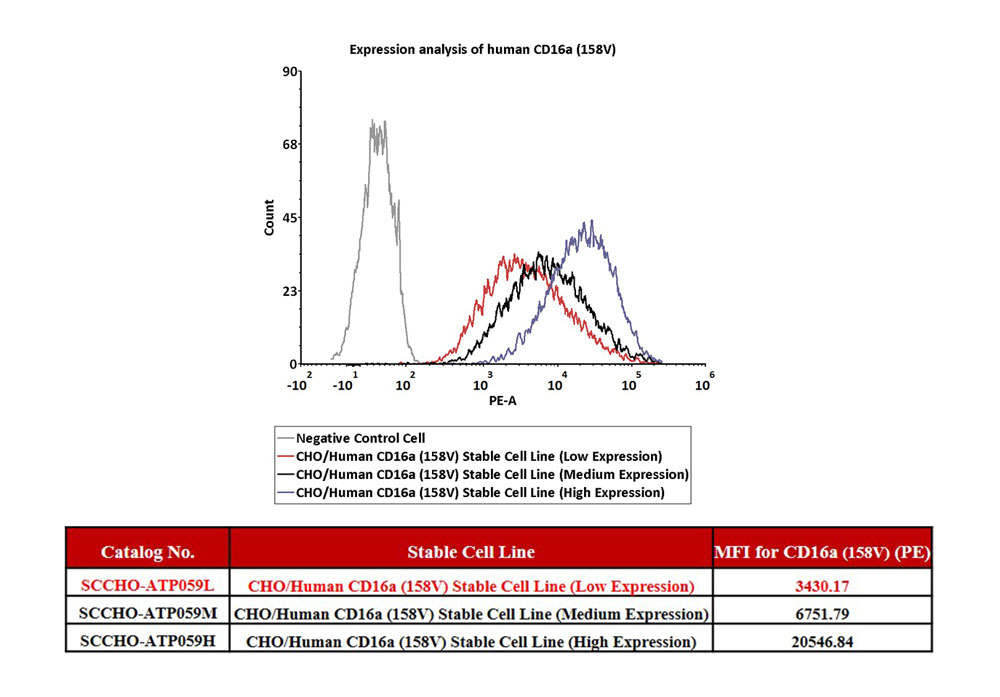| ID | Components | Size |
| CHEK-ATF073 | Human 4-1BB (Luc) HEK293 Reporter Cell | 2 Vials |
| SCCHO-ATP059L | CHO/Human CD16a (158V) Stable Cell Line (Low Expression) Development Service | 2 Vials |
- Genetically modified cell lines best reflect MOA (Mechanism of Action)
- Higher activity and larger assay window for robust and reproducible cell-based bioassay
- Comprehensive application data to support assay development and validation
- Full tracible record, stringent quality control and validated cell passage stability
- Parental cell line legally obtained from internationally recognized cell resource bank and commercially licensed
- Global commercial license assistance whenever regulatory filing is required
描述(Description)
The Cell-based Kit consists of two engineered cell lines, Human 4-1BB (Luc) HEK293 Reporter Cell (Cat. No. CHEK-ATF073) and CHO/Human CD16a (158V) Stable Cell Line (Low Expression) (Cat. No. SCCHO-ATP059L). The Human 4-1BB (Luc) HEK293 Reporter Cell was engineered to not only express NF-κB signaling response element, but also express the receptor full length human 4-1BB (Gene ID: 3604), which can drive luciferase expressing systems by 4-1BB ligand/agonist antibody stimulation. The CHO/Human CD16a (158V) Stable Cell Line was engineered to express full length human CD16a (158V) receptor, with different levels of CD16a (158V) expression (High, Medium, Low), which can be used to test agonist antibody whether in a CD16a (158V)-dependent manner to strengthen the agonistic activity. When co-cultured with Human 4-1BB (Luc) HEK293 Reporter Cell and anti-4-1BB agonist antibody, the anti-4-1BB antibody can be crosslinked, thereby strengthening 4-1BB pathway-activated luminescence.
应用说明(Application)
• Screen for Anti-human 4-1BB antibodies whether in a CD16a (158V)-dependent manner to strengthen the agonistic activity
存储(Storage)
Frozen in liquid nitrogen.
支原体检测(Mycoplasma Testing)
Negative
无菌检测(Sterility Testing)
Negative
使用说明(Instructions for Use)
See data sheet for detailed culturing and assay protocol.
活性(Bioactivity)

Expression analysis of human 4-1BB on Human 4-1BB (Luc) HEK293 Reporter Cell by FACS.
Cell surface staining was performed on Human 4-1BB (Luc) HEK293 Reporter Cell or negative control cell using PE-labeled anti-human 4-1BB antibody.
Protocol

Expression analysis of human CD16a on CHO/Human CD16a (158V) Stable Cell Line by FACS.
Cell surface staining using PE-labeled anti-human CD16a antibody was performed on CHO/Human CD16a (158V) Stable Cell Line with different expression levels: CHO/Human CD16a (158V) Stable Cell Line (Low Expression); CHO/Human CD16a (158V) Stable Cell Line (Medium Expression); CHO/Human CD16a (158V)
Protocol
如有相关细胞池需求请联系我们
背景(Background)
4-1BB is also known as CD137, tumor necrosis factor receptor superfamily member 9 (TNFRSF9), induced by lymphocyte activation (ILA), is a co-stimulatory molecule of the tumor necrosis factor (TNF) receptor superfamily. CD137 can be expressed by activated T cells, but to a larger extent on CD8 than on CD4 T cells. In addition, CD137 expression is found on dendritic cells, follicular dendritic cells, natural killer cells, granulocytes and cells of blood vessel walls at sites of inflammation. The best characterized activity of CD137 is its costimulatory activity for activated T cells. Crosslinking of CD137 enhances T cell proliferation, IL-2 secretion survival and cytolytic activity. Further, it can enhance immune activity to eliminate tumors in mice. CD137 can enhance activation-induced T cell apoptosis when triggered by engagement of the TCR/CD3 complex. In addition, 4-1BB/4-1BBL co-stimulatory pathway has been shown to augment secondary CTL responses to several viruses, and meanwhile augment anti-tumor immunity. 4-1BB thus is a promising candidate for immunotherapy of human cancer. CD137 has been shown to interact with TRAF2.
Limited Use&License Disclosure
BY USE OF THIS PRODUCT, RESEARCHER AGREES TO BE BOUND BY THE FOLLOWING TERMS OF LIMITED USE OF THIS CELL LINE PRODUCT.
- If the researcher is not willing to accept the terms of limited use of this cell line product, and the product is unused, ACRO will accept return of the unused product.
- Researchers may use this product for research use only, no commercial use is allowed. "Commercial use" means any and all uses of this product and derivatives by a party for profit or other consideration and may include but is not limited to use in: (1) product manufacture; and (2) to provide a service, information or data; and/or resale of the product or its derivatives, whether or not such product or derivatives are resold for use in research.
- This cell line is neither intended for any animal or human therapeutic purposes nor for any direct human in vivo use . You have no right to share, modify, transfer, distribute, sell, sublicense, or otherwise make the cell line available for use to other researchers, laboratories, research institutions, hospitals, universities, or service organizations.
- ACROBIOSYSTEMS MAKES NO WARRANTIES OR REPRESENTATIONS OF ANY KIND, EITHER EXPRESSED OR IMPLIED, WITH RESPECT TO THE SUITABILITY OF THE CELL LINE FOR ANY PARTICULAR USE.
- ACROBIOSYSTEMS ACCEPTS NO LIABILITY IN CONNECTION WITH THE HANDLING OR USE OF THE CELL LINE.
- Modifications of the cell line, transfer to a third party, or commercial use of the cell line may require a separate license and additional fees. Please contact order.cn@acrobiosystems.com for further details.























































 膜杰作
膜杰作 Star Staining
Star Staining












